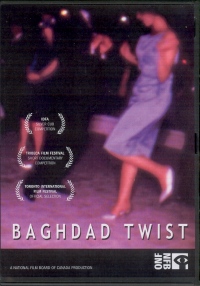| ________________
CM . . .
. Volume XVI Number 19. . . .January 22, 2010 
 |
Baghdad Twist.
Joe Balass (Director). Germaine Ying Gee Wong (Producer). Ravida Dan & Sally Bochner (Executive Producers).
Montreal, PQ: National Film Board, 2008.
33 min., 35 sec., DVD, $99.95.
Order Number: 153C 91-7 252.
Subject Headings:
Jews-Persecution-Iraq-Baghdad.
Cultural pluralism-Iraq-Baghdad.
Political refuees-Canada-Interviews.
Grades 10 and up / Ages 15 and up.
Review by Frank Loreto.
*** /4
|
| |
|

Not that long ago, there were 180,000 Jews in Iraq, most of whom lived in Baghdad. These Jews were Iraqi by birth and saw Iraq as their homeland. However, over time and due to a variety of negative circumstances, these numbers have dwindled to fewer than 12,000. With the creation of the State of Israel, a large number left after 1948 to help build the new country. Before 1967, life was good for Iraqi Jews; however, after the Six Day War, everything changed. As Israel proved itself victorious in the war, feelings of friendship toward the Jews in Iraq disappeared. Non-Jewish Iraqis suddenly did not acknowledge their Jewish friends. Government leaders began warning the people of the dangers of the Jews. Home phone lines were cut; police surveillance, early morning visits and detainment became common. Travel for Jews was also restricted. For some of the remaining Jews in Iraq, the time had come to leave.
Filmmaker Joe Balass tells this story from the point of view of his mother who describes her life in Iraq. She remembers her youth fondly and states that she was "an Iraqi and that was it. I was a Jewish Iraqi." While she talks about the destruction of their life in Iraq and the move to Canada, she remains matter-of-fact about her experiences. Mixing home movies and documentary clips, Baghdad Twist tells one story of the changes in Iraq.
The film begins with a wedding video. The gathering looks very modern as they dance the Twist and are clearly having fun. As this video plays, however, Balass's mother states, "I never saw ice and snow before," and the film cuts to a scene of a blizzard. The family arrived in the middle of a huge storm. Welcome to Canada! A documentary clip included early in the film has an announcer enthusiastically presenting the new modern Iraq and shows how the women are "breaking with tradition to more modern and practical clothing." A more "liberal" attitude towards life seems to be taking hold. Balass's mother looks back with a degree of nostalgia, and more shots of the wedding show great hope.
Sadly, as outside events began to affect their lives, things began to change. The loss of friends who moved away was gradual, and those left behind were able to adapt. However, when Balass's father was taken by the police for questioning and sent to prison three times, clearly, this could not be home any longer. When a doorbell ringing causes great fear and when thousands of people dance and sing because two people were hanged, it is time to leave. The family simply slipped away as if they planned to return shortly. Balass's brother asked his mother if she thought that she was endangering the whole family. She admits that she did not know. The film closes with more wedding video and as the dancers are "Twisting" away; they have no idea how their lives will be changing in a rather short time.
Baghdad Twist is a deceptively simple film. Presented as a conversation between mother and son, with accompanying family videos, there are many things going on here. The Balass family story is only one of thousands of such stories. What does it mean to have to escape your homeland in order to survive? What is it like setting up a new home in a place nothing like what you are used to? How does it feel to never be able to return home? The narrator makes it clear that the choices were difficult, but she is not going to assume the role of a martyr. Things had to be done, and they were. Now her son is able to report it, but this is probably not the way the dancers at the wedding saw their futures.
This film would have applicability in any courses dealing with World Politics, Family Studies, Women's Studies, World History or Canadian History, looking at the multicultural mix of Canada. As the film also shows what happens to the minority when a society turns mob-like and against it, there would be potential for use in any Psychology or Sociology class.
Recommended.
Frank Loreto is a teacher-librarian at St. Thomas Aquinas Secondary School in Brampton, ON.

To comment
on this title or this review, send mail to cm@umanitoba.ca.
Copyright © the Manitoba Library Association. Reproduction for personal
use is permitted only if this copyright notice is maintained. Any
other reproduction is prohibited without permission.
NEXT REVIEW |
TABLE OF CONTENTS FOR THIS ISSUE
- January 22, 2010.
AUTHORS |
TITLES |
MEDIA REVIEWS |
PROFILES |
BACK ISSUES |
SEARCH |
CMARCHIVE |
HOME |
